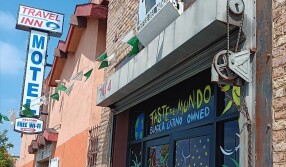ACLU SoCal’s First Artist-in-Residence on Creating Art During a Fraught Time

In a powerful clip that lasts less than two minutes, Luis “George” Lopez’s voice trembles as he recounts what it was like reuniting with his family after being released from the Adelanto ICE Processing Center in San Bernardino County. The only imagery accompanying the sound of his voice is a drawing of the bespectacled Lopez in a collared shirt, set against a minimal blue background.
The video is part of an ACLU of Southern California series called, "On the Line: COVID Conversations.” It features people giving personal testimonies about the dangerous health conditions they’ve faced in jails, prisons, ICE detention facilities and homeless shelters during the pandemic. The artist who illustrated these humanizing portraits is 37-year-old Audrey Chan, ACLU SoCal’s first resident artist.
While the Los Angeles-based artist and educator started her yearlong program with the nonprofit last October, she said she’s been extra busy since the stay-at-home order went into effect in March. ACLU SoCal has worked with other artists and illustrators in the past, but this inaugural program is unique in that they’ve brought in an “artist into their space to learn how to collaborate with them intimately,” Chan said. “I feel like I'm continuing my civic education there by learning about the full breadth of their work and the many ways civil liberties and rights are constantly being violated. It's been eye-opening to see how much organizing it takes to hold governments accountable.”
Amid the pandemic, ACLU SoCal staff has had to get creative with the ways they’ve been presenting their storytelling, which is integral to their causes. Since they were only able to record audio calls for “On the Line” due to social distancing, they supplied Chan with photographs of the subjects as inspiration for the portraits. “It was really meaningful because the photos that they shared with me were, in some cases, family photos or selfies,” Chan said. “They showed these individuals in moments from their everyday life, so there was a lot of dignity in those images.”
ACLU SoCal had to shift gears on another campaign due to COVID-19. Its “ICE is Not Welcome” initiative focused on informing immigrants about their rights when it came to dealing with ICE agents at their door. Chan said the organization originally planned to hold rallies and distribute materials, but with the health crisis, they focused instead on digital assets that could become printable door hangers, community handbooks, and coloring sheets.
Click right and left to see the posters created by Audrey Chan:












Chan was initially surprised that ACLU SoCal wanted her to create cute graphics for the campaign. In one of her colorful images, a young girl in pigtails has her hand in a “stop” gesture; a group of people representing diverse ethnicities and age groups confidently stand behind her.
“[ACLU SoCal] specifically said they wanted something that was more community-centered and showing a young, empowered girl defending her community,” Chan said. “They said that it was really important to them for the campaign to be directed at families, which includes children. They were challenging narratives rooted in fear, because the tactics ICE uses and the culture of immigration enforcement make people feel vulnerable and afraid and powerless. They wanted the campaign imagery to counter that culture and tone.”

ACLU SoCal often has conversations about what makes aspirational imagery, according to Chan. “Can art picture a world that we might not be able to see right now, and can it create the space to imagine something better?” she asked. “I think especially with artists’ portraits of people who've been murdered by police, those portraits allow for collective mourning and honoring the lives that were robbed. I think it’s so important to have beauty through struggle. The graphics and illustrations and artwork that are circulating right now really speak to that importance. There are so many different ways to be visual and political at the same time. What any particular generation responds to most is constantly evolving.”
Chan has found the hand-drawn portraits and infographics breaking down the systemic inequalities in our nation to be particularly moving. “I’m seeing all these opportunities for people to learn and have points of access into activism right now when a lot of us are at home and communicating through social media,” she said.
The Movement for Black Lives is poignant for Chan, who is Chinese American. She said she is invested in the work it takes to change the narrative and build solidarity between the Asian American Pacific Islander (AAPI) community and the indigenous, Black and Brown communities.
“This is a personal struggle for me as well, since my husband and I are raising a Black son (of Chinese and Jamaican descent) in an America that has normalized a culture of white supremacy and erasure,” Chan said. “In this moment of collapse, mourning and uprising, I am learning the work of how to actively dismantle and rebuild broken social and cultural systems from the leadership of social justice movements for his generation and those to come. So, I join the movement as a mother, artist and storyteller.”
Chan, who has an MFA from California Institute of the Arts, has a strong background in working on thoughtful, research-based storytelling projects. For ACLU, she recently drew portraits of AAPI civil rights leaders and activists like Mia Yamamoto, Larry Itliong and Yuri Kochiyama to commemorate AAPI Heritage Month in May.
Click left and right to see Audrey Chan's portraits of AAPI civil rights leaders and activists:














Separate from her work with the nonprofit, Chan has been spearheading a 14-panel mural that serves as a vibrant tableau representing the complex history of Little Tokyo. It will be installed in the Little Tokyo/Arts District Metro Station, which is slated to open in 2022.
Exploring ideas behind systems of power is not something new to Chan. The artist, who spent her formative years in the Chicago area, is the child of immigrant parents and academics. Her family always discussed how history continues to be part of the present. Chan’s mother immigrated from Taiwan, and her father by way of Thailand after fleeing China in the early years of the Communist Revolution. “My dad would tell me stories about growing up during the rise of [China’s] dictatorship and how a state or government can act upon its own people,” Chan said. “So, I grew up not taking for granted that a government or systems of power would necessarily protect you.”
This has shaped the way Chan approaches her work today. She is humble, understanding that she still has so much to learn and that there are many stories that aren’t written in history books that need to be explored and shared.
“I know that I’m working on the right project because I come out of it knowing I’m a different artist than before I went in,” Chan said.
Top Image: ICE Not Welcome poster | Audrey Chan, ACLU SoCAL















